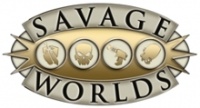 Rolling for Initiative is a weekly column by Scott Thorne, PhD, owner of Castle Perilous Games & Books in Carbondale, Illinois and instructor in marketing at Southeast Missouri State University. This week, Thorne looks at GURPS, Savage Worlds, and other generic roleplaying systems.
Rolling for Initiative is a weekly column by Scott Thorne, PhD, owner of Castle Perilous Games & Books in Carbondale, Illinois and instructor in marketing at Southeast Missouri State University. This week, Thorne looks at GURPS, Savage Worlds, and other generic roleplaying systems.With the release of Beasts and Barbarians, a fantasy supplement from Gramel Publishing, Savage Worlds moved one step closer towards its apparent goal of replacing GURPS as, well, a gurps. By my count, so far, Savage Worlds has a horror supplement, a couple of fantasy supplements, a superheroic supplement, two versions of Martian high adventure, science fiction horror, a zombie outbreak supplement and, oh yeah, let's not forget Deadlands. While certainly not as comprehensive as Steve Jackson Games' GURPS (especially the Third Edition, GURPS Robin Hood anyone?), Savage Worlds is the only print RPG I have seen making use of its core system to expand into other genres, as Chaosium has its Basic Role Playing System but hasn't expanded it much beyond Call of Cthulhu and, during the last presentation from them I caught, Steve Jackson Games didn't even mention the fact that they publish what was at one time one of the top selling RPGs.
Generic RPG systems tend to be an awkward animal for players to purchase and run, simply because, in order to work as a true generic system, they have to morph into many different variants, some of which can really contort the core system. Hero Games, for example, came out with a very good system for replicating superpowers and then worked to modify it for use in the pulp genre, the fantasy genre and the space genre. However, in order to do this, the Hero System had to de-emphasize the super powered aspects of the game, since in most of the other genres, the hero has either limited or no extra-human abilities. This meant that superpowers had to get drastically downsized and skills, which were of significantly less importance in the Champions game, took center stage in the other variations. However, since the system was not skill-based to start with, players never warmed to the other versions, which is why a store can have an entire shelf of Champions super-heroic products but only a smattering of expansions for other genres.
Chaosium is the other company that made an effort to create a generic system and it works much better as a generic system than the Hero System does, mainly because its base system, Runequest, starts with the individual, viewing them as a collection of skills and attributes. When Avalon Hill owned the RuneQuest system during the late 80s, the company worked to make it more of a generic system, releasing supplements for Norse and Japanese settings. However, customers still preferred the original Glorantian setting for RuneQuest and the generic variants never took off. Mongoose Publishing is the latest company trying to make a go of RuneQuest, which has never regained the popularity it had during the 1980s, while Chaosium appears satisfied with using the Basic Role Playing System as the core rules engine for Call of Cthulhu.
The big problem with generic systems appears, at least from my viewpoint, that with the exception of GURPS, their creators did not develop them as generic systems. The designed built them for replicating a specific genre and only afterwards tried modifying the system, generally with little success, to make it more generalizable and thus target a wider audience. Given the vast array of RPG systems existing on the internet, successful generic systems may exist. Anyone know of any?
The opinions expressed in this column are solely those of the writer, and do not necessarily reflect the views of the editorial staff of ICv2.com.


